By Lambert Strether of Corrente
This is a quick and advanced post, I hope, to cleanse the palate from elections, assassinations, drones, liquid cats, and everything else. I saw this amazing post the other day on Twitter and surprisingly it went viral:
The series prompted me to discover that “spell” (as in spell) and “nopelo” (as in spell) were originally the same word, or at least from the same root, but sadly, no. From the American Heritage Dictionary (AHD, hereafter):
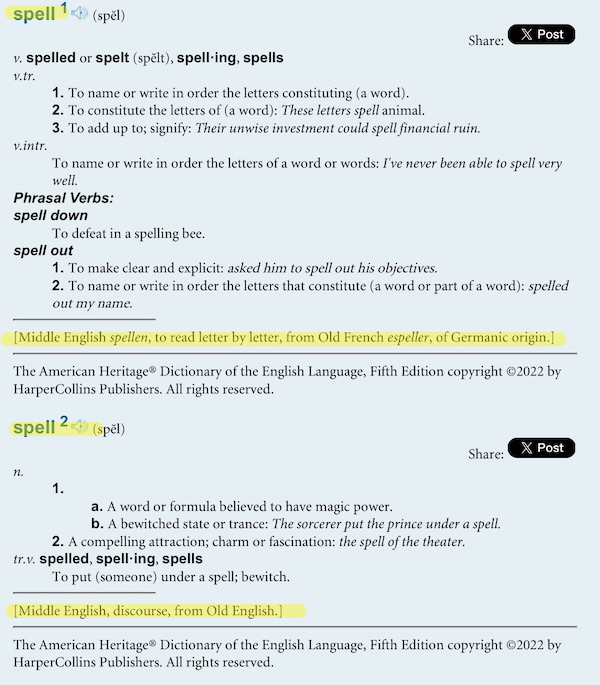
Then again, at least in Ursula LeGuin’s Earthsea, a witch has power over something when she knows its true name – especially if she knows not to use that power – and how can you know the true name if you can’t spell it? LeGuin’s dictionary was the Oxford English Dictionary (OED), although as we can see, there are different versions of the product (Compact, Shorter, etc.):
All my life I have written, and all my life I have (without conscious decision) avoided reading literary material. The Short Oxford Dictionary and Follett and Fowler’s manuals are my toolkit.*
* Note (1989). I use Fowler and Follett very rarely now, I find them authoritative. Strunk and White’s Elements of Style, edited and supplemented by Miller and Swift’s Words and Women, is my road atlas to English, and has never led me astray. A second-hand copy of the Oxford English Dictionary in small volumes has been a constant source of learning and entertainment, but the Short Oxford is still ready for a quick fix.
In any case, a seven-year-old girl discovered the OED. What a gift! I got my OED when I was much older (although my mother read me the Encyclopedia volumes we took every week from A&P). I was working in the mills of Providence, RI at the time, and ordered my OED from the Book of the Month group. The pages looked like this, which is why it came with a magnifying glass (although I learned to blink):
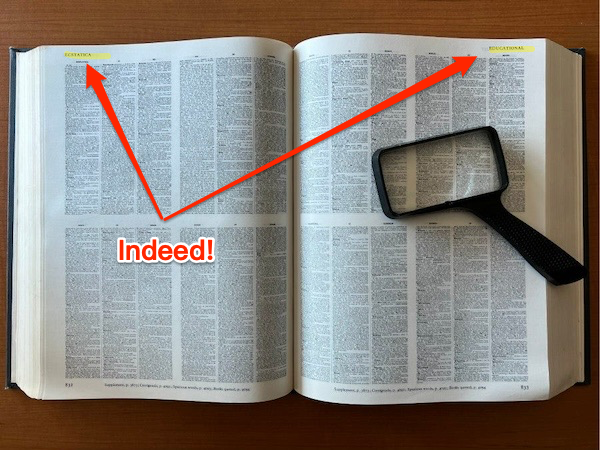
The OED, I thought, would be useful to me in my vocation as an old poet, though I discovered too late that I had nothing to say, at that age, in that way. Anyway, I followed it until I lost my first collection of lost books.
Sometime between the mills and the advent of the personal computer, I discovered Raymond Williams, who put his encounter with the OED to much better use than I did. In his book Key wordspage 13:
Then one day in the basement of the Seaford Public Library, where we were going to live, I looked up traditionjust about, one in thirteen [now twenty (!!)] volumes of what we commonly call the OED: the Oxford New English Dictionary on Historical Principles.
“Historical principles” mean that there are examples of usage everywhere (collected by “scribes” who do, I suppose, “citizen etymology,” in a social pile-up like the one we just saw in the Macauley Library). Williams continues:
It was like a shock of recognition. The paradigm shift I was trying to understand had begun in English, it seems, at the beginning of the nineteenth century. The connection I had felt with class and art, with industry and democracy, took on, through language, not only intellectual but historical context…. [T]his was the time when the investigation that had begun to try to understand several urgent problems of the time – literally problems of understanding my present world – gained some form in trying to understand culture. This work, which was completed in 1956, became my book Culture and Society
To follow Culture and SocietyWilliams continued to write Key words. From page 14, the following convention:
Quotations followed by name and date only, or date only, are from examples cited in the OED.
Example assembly, on page 50:
CAPITALIST as the name is a little old; Arthur Young used it, in his journal Travels in France (1792), but casually: ‘moneyed men, or capitalists’. Coleridge used it in a more advanced sense – ‘capitalist . . . to have work where needed’ – in Tahletalk (1823).
So who knows what that seven-year-old girl will end up doing!
However, my first reference book – I was a youth poet, too he did you have things to say, at the time – it was (photo by James Moss) Roget’s Thesaurus, the kind we now see as archaic. It looked like this:
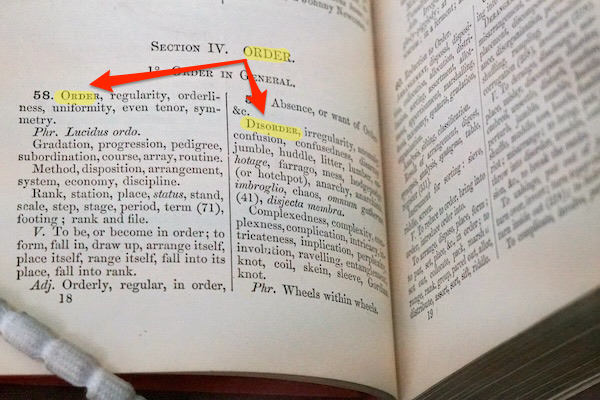
As you can see, Roget organizes words into classes (“Order” is #IV out of six). Within each class, opposing concepts are placed, well, opposite; as we see, Order vs. Disorder, or “progress,” “lineage,” “economy,” and “channel” are on the left, along with “irregularity,” “confluence,” “farrago,” and “evil.”disjecta membra” on the other. Not unlike Newspeak, where “‘un–’ is used to indicate negation, since Newspeak has no non-political negative words.” Now, of course, I’ve forgotten all those stupid things of youth, but the joy of looking from left to right to find the opposite and the extreme opposite – is “difficult” actually the opposite of “normal”? – and changing each word in my fingers always.
Sylvia Plath – a real, old poet – had used Roget’s (photo by Peter K. Steinberg), so I went to look, and found (photo by Peter K. Steinberg) sold at auction (“Lot 309”). Here it is, complete with underlining:
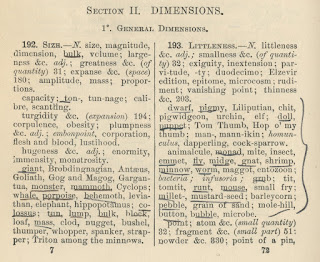
(Mystery: Moss uses the same page in Steinberg – “order versus disorder” – but does not mention Plath. Why?)
One more thing: Shortly after I found Roget, I found the AHD Dictionary of Indo-European Roots:
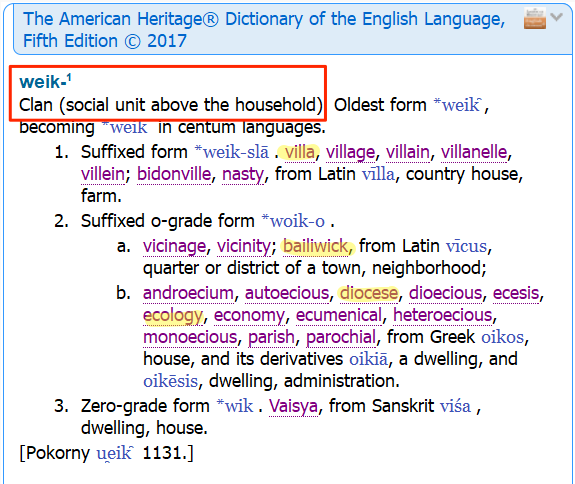
Interestingly, “villa,” “bailiwick,” “diocese”, and “ecology” (!!) all come from the same root. The best infinite forms!
The complex data structures in all these works – historical systems (OED), classification systems (Roget), tree structures (AHD) may not have inspired great poetry in me, but they certainly prepared me for a life of manipulating symbols, like PMC. manque that me!
In conclusion, I strongly recommend that you give the seven-year-olds in your life – as well as poets, wannabe poets, autodidacts, or those who want to master the wonderful English language – reference works like the Oxford English Dictionary. . And not the online versions, which are unfocused, hard to use, and track you. Find books that are physical, durable, and durable. Go to a used bookstore and get books, the older the better. Maybe you’ll hit the jackpot and get all twenty full-size volumes of the OED!

Source link